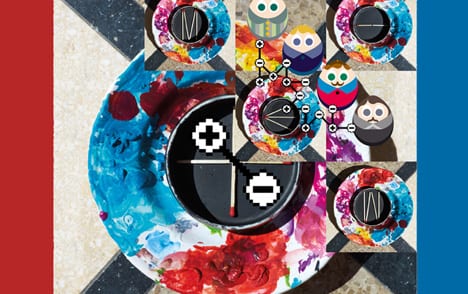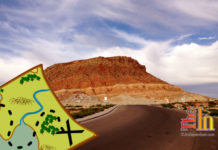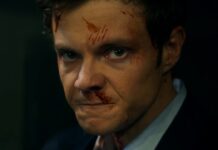Written by Jason Gottfried
Danish quartet Mew describes their sound as “indie stadium.” That’s fitting. Even upon first listen, they’re clearly European, and one might say they sound very much like the Icelandic band Sigur Rós, except that Mew sings in English rather than Sigur Ros’s made-up language, Vonlenska (which translates into English as “Hopelandic”).
Rich Costey, who produced Mew’s breakthrough album, “Frengers,” as well as their last album—the audaciously titled “No More Stories Are Told Today, I’m Sorry They Washed Away // No More Stories, The World Is Grey, I’m Tired, Let’s Wash Away,”—returns for “+-.” While the most recent title clearly favors brevity, it’s similarly phonetically confounding. “+-” is also just as upbeat and perhaps even more sparkly than its predecessor, glistening with ‘80s nostalgia, dripping with synthesizers, and awash with reverberation. Jonas Bjerre’s feathery, often falsetto vocals evoke Richard Marx as well as just about every other pop tenor from 30 years ago. Neither pretentious nor commercially vapid, Mew’s “+-” succeeds in being both artful and accessible.
Opening with harp arpeggios, their first single, the synth-poppy “Satellites,” firmly anchors the album stylistically among past Mew offerings. Similarly, “Witness” is the kind of precise, high-energy pop rock that fans expect.
Fellow Icelander Kimbra appears in “The Night Believer.” For better or for worse, Bjerre’s vocals are already effeminate enough that Kimbra’s vocals are absorbed into the mix, hardly distinguishable from Bjerre’s.
A less cohesive “Making Friends” tiptoes towards R & B territory with a funk riff, but the quasi-orchestral synths aren’t convincingly integrated; furthermore, the song wants to bob along as a shuffle at times, yet a straight-feeling tambourine resists, and the groove they seem to pursue never fully clicks.
Sounding like prog-rockers for the first time in “+-,” “Clinging to a Bad Dream” enters with noises from the street and the sound of birds chirping. Kalimba riffs and Geddy Lee-worthy bass lines compete with percussive syncopation, and the song toys with hemiola rhythms, finally modulating metrically about halfway through before fading out into a choral fog.
Bloc Party’s Russel Lissack joins in “My Complications,” both cowriting and appearing in the studio. Lissack’s licks appropriately hearken back to both some of Mew’s previous guitar-driven work as well as—of course—Bloc Party. However, vocal melodies doubled by glockenspiel and piano octaves help maintain that nostalgic ‘80s sound.
“Water Slides” ventures so deeply into the past that it’s impossible not to hear bits of Duran Duran in there, albeit sung an octave higher. It’s one of the catchier, chorus-driven songs. You can almost hear the hairspray and eyeliner. The same could be said of “Interview the Girls,” which sounds like it was written specifically for the stadium.
The real grandeur, however, occurs in the spacious “Rows,” which is more than ten minutes of ebullient anthem pop. About halfway through, “Rows” rises fully, expanding to an extent that could be compared to Tears for Fears at their most majestic. Closer to the end, the song modulates metrically, and a piano-driven ostinato reminiscent of Philip Glass slowly builds as drum bursts evolve into a full-on galloping beat, which is where the song fades.
The closer, “Cross the River on Your Own,” distills every element present in the album, blossoming gently into a final burst of soft rock splendor that would make Kevin Cronin envious.
Mew’s “+-” is essential listening for all indie music lovers. Not too hard, nor too soft, it’s approachable by a variety of audiences. Of course, longtime fans will celebrate Mew’s sixth release. But for listeners who missed out on Mew over the past decade, “+-” is an excellent primer.




